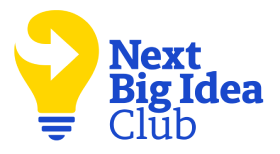Salman Khan is the founder and CEO of Khan Academy, a nonprofit with the mission of providing a free, world-class education for anyone, anywhere. His lessons on YouTube have revolutionized learning, garnering billions of views globally. Recognized as one of Time’s 100 Most Influential People in the World, Khan is also the founder of schoolhouse.world, Khan Lab School, and Khan World School, and the author of The One World Schoolhouse.
Below, Salman shares five key insights from his new book, Brave New Words: How AI Will Revolutionize Education (and Why That’s a Good Thing). Listen to the audio version—read by Salman himself—in the Next Big Idea App.
1. Teachers matter.
If I had to pick between an amazing teacher with no technology and amazing technology with no teacher, I would pick the amazing teacher every time. This becomes even more pronounced in an AI world. AI is going to become an amazing teaching assistant. It’s going to help with grading papers, writing progress reports, communicating with others, personalizing their classrooms, and writing lesson plans. It’s going to give teachers insights into their classrooms that they never had before. But AI is never going to be able to replace the ability to form human connections with students.
That’s why teachers go into the profession. They don’t want to do the busy work of grading papers and writing lesson plans. They want to change student lives. Now, they’re going to be better supported. This support will be more important than ever given how key this profession is and how spread thin teachers are globally.
2. We are about to see a real revolution in world-class learning.
Khan Academy’s mission statement as a not-for-profit is free, world-class education for anyone, anywhere. From the beginning, we always imagined that technology—including things like the internet, on-demand video, personalized software, and teacher tools—could be used to scale up the types of interactions that I used to have with my cousins.
The starting story of Khan Academy began when I worked in tech and as an analyst at a hedge fund. My cousin needed tutoring, so I started tutoring her. Word spread in my family that free tutoring was going on, and before I knew it, I was tutoring many cousins. The whole journey of Khan Academy until now has been to leverage technology and tools for educators to scale up the type of personalization and student-centered learning that I was originally able to do with my cousins.
We’ve gone very far with Khan Academy. What generative AI now allows us to do is get that much closer to world-class tutoring. It raises the ceiling of what’s possible.
I used to hand science fiction books to employees at Khan Academy, talking about AI tutors of the future. I remember thinking, “One day, Khan Academy will build this. It’s probably not in my lifetime, but fingers crossed, as long as we’re around for many decades, it is in our lifetime.” It is now in the coming years. People need to appreciate how powerful these tools are if you have children, if you care about children, or if you want to learn something yourself.
3. Writing will improve, not degrade.
That’s a bold statement because when ChatGPT came out, there was concern that AI would be used for cheating. The thought was that it would undermine writing as we know it.
Having talked to administrators at some of the top universities in the world, there is also concern about many students going to selective universities without knowing how to write. No one knows exactly why this is. It’s probably years of standardized tests that focus on multiple choice. There has been less of an opportunity to write and get feedback. Khan Academy is building tools to help with this. Not only can the teacher work with the AI to write a lesson plan, create an assignment, and create a rubric, but they can administer the assignment through the AI.
“AI can also give insights into an entire class that the teacher never had before.”
When the student works with a properly ethical AI, the AI won’t do the essay for them; rather, it will assist with coming up with a thesis statement. It will encourage outlining together. It will give feedback. It might suggest better sources or improve citations. Most students are not getting writing feedback unless they have the benefit of a writing coach or really involved parents.
When the student’s work is finished, AI can ask, “Are you ready to submit?” The student submits their writing to the teacher, who will give the final output. The teacher will be able to access the entire writing process. They will be able to talk to the AI like a writing coach who’s worked with every one of their students. It can report how long a student worked on the project, what they had trouble with, and what they did well.
Then, based on the teacher’s rubric, the AI can even grade the work. The teacher still remains in charge, but the AI can assist in the process. Hopefully, it will save time. The AI can also check to see if the work is consistent with the other work by the same student. It will be able to share a whole transcript about how the student worked with AI.
AI can also give insights into an entire class that the teacher never had before. It could let the teacher know that 15 of the students are having trouble with the thesis statement and generate a lesson plan to help those students.
This would be supporting students far more than they’ve ever been supported. It’s going to give more rapid feedback. It gives time back to the teacher. Imagine being a middle school teacher and having to grade a hundred papers on The Great Gatsby over a weekend. It’s not super fun, and you might not be able to do it all consistently. Now you finally have support while gaining insights into the process.
Cheating existed before chat GPT. Some folks on the internet will happily write your essay for five dollars a page. This could actually undermine all forms of cheating, including paying someone the internet or getting your older sister to write it for you. But the more important thing is that AI can ensure that students are getting more rapid-cycle support than they’ve ever gotten before, giving teachers more support and insights.
4. Kids still need to learn a lot.
Every time there’s new technology, folks will argue that kids don’t need to learn those skills anymore. For example, when the calculator comes out, kids no longer need to learn arithmetic. The internet allows kids just to look things up, so folks may argue they don’t need to know certain things anymore.
I’ve never believed that. If you know your arithmetic well, you’re going to use a calculator well. There will also be times when you don’t have a calculator around. Additionally, just knowing the arithmetic will allow you to draw connections.
“Generative AI can write code, but to create truly great applications, you need to know what great code looks like and be able to put the pieces together.”
If you have content knowledge or general knowledge about the world, you will be a more productive user of things like a search engine. The same thing is now true with generative AI. Having knowledge and skills makes you better at using them. If you are a student or if you have children, do you want to be outrun by the generative AI, or do you want to be in a position where you can put those pieces together?
Generative AI can write code, but to create truly great applications, you need to know what great code looks like and be able to put the pieces together. To do that, you must be comparable or at least able to hang with the AI. The same thing is true of writing, music composition, or editing. Those who have those skills and also have the skills to put the AI pieces together are those who are going to thrive in the job market in the future. Those who get passed up by the AI—who rely on the AI but don’t know how to put the things together to make great things—will be in trouble.
5. AI isn’t good or bad.
At every dinner party now, there are conversations about the philosophy of artificial intelligence. People discuss where it can be harmful, such as misinformation, deep fakes, and fraud.
But where could it be positive? Maybe it will do well in healthcare or education. I always point out that it isn’t a flip of a coin. This is a technology that amplifies human intent. Like technologies before it, this just feels a little bit special because it’s hitting something that we always thought was special about humans: our intelligence.
But since it amplifies human intent, what matters is our intent. We know there are bad actors with negative intent, and they will put a lot of energy behind that negative intent. It’s critical that all of us put as much energy as possible into the positive intent.
Just because bad people are doing bad things with AI is not a reason to run away. It’s not a reason to slow down on the positive intent. The bad actors aren’t going to slow down. We must all learn as much as we can about it, expose ourselves to it, and use it intelligently to empower other people. There’s an opportunity to use artificial intelligence to improve human intelligence, human potential, and human meaning.
To listen to the audio version read by author Salman Khan, download the Next Big Idea App today:










